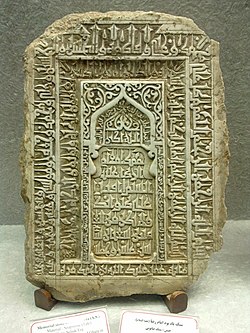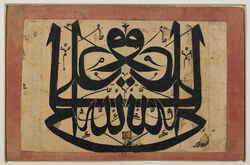Religion:Verse of Wilaya
| Part of a series on |
| Islam |
|---|
 |
|
|
The Verse of Wilāya (Arabic: آيَة ٱلْوِلَايَة) refers to verse 5:55 of the Quran, the central religious text of Islam. This verse specifies three authorities as the only sources of wilaya for believers. In Sunni Islam, wilaya in this verse means friendship and support, whereas Shia Muslims interpret it as spiritual authority because of its exclusivity.
The first two authorities listed in this verse are God and the Islamic prophet Muhammad. In some Sunni sources, the third authority includes all believers, whereas Shia sources identify the third authority in this verse as Muhammad's cousin and son-in-law, Ali, referring to the occasion of its revelation. In Shia Islam, this verse thus signifies the spiritual authority of Ali over believers, after God and Muhammad, and supports his (usurped) right to succeed Muhammad. Other Sunni sources link this verse to Ali but reject any Shia implications.
Wali
The Arabic word wali can mean guardian,[1] friend, helper, or master.[2] The plural form is awliya' and the words wilaya, awla, mawla are of the same Arabic root, all appearing in the Quran.[3]
The related concept of wilaya is particularly difficult to translate since the term takes various meanings in different contexts.[4] In a political sense, wilaya refers to authority and power, as personified by the leader of Muslim community after Muhammad, a reference to the Quranic term uli al-amr (lit. those in command).[5] For Sunnis, wilaya specifically refers to state-building.[5] For Shias, however, wilaya primarily denotes the spiritual authority of the Shia Imams (and the prophets in their capacity as Imams). They are viewed as both master and friend in a believer's spiritual journey towards enlightenment. In contrast, prophets are concerned with the outward aspects of religion, namely, religious laws and ordinances.[4][5] As such, the term wali is applied to Shia Imams in Shia Islam and to Sufi Sheikhs in Sufism.[6][7] Particularly in Sufism, wali Allah (lit. friend of God) denotes God's elect.[8]
Verse of Wilaya
Verse 5:55 of the Quran, known in Shia as the Verse of Wilaya,[9] is translated by The Study Quran as
Your protector [wali] is only [innama] God, and His Messenger, and those who believe, who perform the prayer and give alms [zakat] while bowing down.[9]
Landolt and the Shia Tabatabai (d. 1981) give similar translations,[10][11] though the Sunni Abdullah Yusuf Ali translate this verse as, "Your (real) friends are (no less than) Allah, His Messenger, and the believers---those who establish prayers and pay zakat and they bow down humbly (in worship)."[12]
Occasion of the revelation
Jewish tribes
Verse 5:55 was revealed in Medina.[6] The Sunni Ibn Kathir (d. 774/1373) and al-Kashani (d. 736/1336) suggest that the verse was revealed after Ubada ibn al-Samit broke his ties with the Jewish clans and pledged his allegiance solely to Muhammad. Alternatively, the Sunni exegeses Tafsir al-Jalalayn and Asbab nuzul al-Qur'an consider this verse a response to some companions who complained about social ostracization by some Jewish tribes.[9] The Sunni Ibn al-Kalbi (d. 819) writes that the verse was revealed when Abd Allah ibn Salam and some others converted to Islam and the Jewish tribes subsequently revoked their contract of clientage (muwalat).[13]
Ali
In contrast, Shia and some Sunni commentators, including the early influential Ibn Abbas (d. 687) and Mujahid, consider this verse a specific reference to Ali. Such reports are included in the works of the Shia al-Mufid (d. 413/1022)[14] and the Sunni al-Baydawi (d. 685/1286), Ibn Kathir, al-Tabari (d. 310/923), al-Zamakhshari (d. 538/1144), al-Wahidi (d. 468/1076),[9] al-Razi (d. 606/1210),[15] Ahmad al-Tabari (d. 1295), and al-Suyuti (d. 911/1505).[16]
In these reports, verse 5:55 is connected to when Ali gave away his ring to a beggar while he was bowing in worship.[9] Al-Tabari narrates a tradition to this effect from the Shia Imam al-Baqir (d. c. 114/732) but also includes a contradictory report in which al-Baqir explicitly denies any specific link to Ali. The two traditions share a common origin in the isnad which Lalani regards as problematic. The attribution of this anti-Shia report to al-Baqir may also suggest some early debates about the status of al-Baqir as a Shia Imam.[17] A minority of traditions link verse 5:55 to Abu Bakr.[9]
Nasr et al. suggest that the frequent association of this verse with Ali in early Sunni sources strongly support its authenticity.[15] In particular, the Sunni Ahmad al-Tabari includes the following detailed account on the authority of Abu Dharr (d. 652), a companion of Muhammad.[18]
One day we prayed the noontime prayers with the prophet. A person in need asked people to help but no one gave him anything, "Oh God! Be witness that in the mosque of the prophet no one gave me anything." Ali ibn Abi Talib was in the position of genuflection in the prayers. He pointed with his finger to the person, who took his ring and left. The prophet, who was observing the scene raised his head toward heaven and said: "Oh God! My brother Moses said to Thee, 'Expand my breast and make easy my tasks and make my tongue eloquent so that they will comprehend my words, and make my brother, Harun, my help and vizier. [cf. Quran, 20:35]. Oh God! I am also Thy prophet; expand my breast and make easy my tasks and make Ali my vizier and helper.’" The words of the prophet had not as yet finished when the verse [cited above] was revealed.[18]
Exegesis
For the Sunni al-Tabari, 'believers who give alms while bowing down in prayer' describes believers in general, whereas the Sunni al-Razi and al-Zamakhshari view them as sincere believers who are untainted by hypocrisy. The verse may also signal that one should perform these religious deeds in a state of humility, according to these two authors.[9]
Debate about Ali
For the Shia, wilaya in this verse is interpreted as spiritual authority. Verse 5:55 thus describes Ali as the rightful authority over the believers, after God and Muhammad, and signifies his right to succeed Muhammad as the spiritual and political leader of the Muslim community.[19] The hadith literature, consensus among scholars, and the occasion of the revelation are cited in Shia sources to support this interpretation.[20] Verse 5:55 might be the most frequently cited verse by the Shia in support of Ali's rights.[20]
Alternatively, those Sunni authors who acknowledge a link between this verse and Ali reject any Shia implications.[15] For the Sunni al-Zamakhshari, the verse encourages Muslims to emulate Ali, who did not delay charity even until the end of his prayer.[9] On the other hand, the Sunni Ibn Kathir questions the authenticity of the related hadiths.[15]
Extent of wilaya
Similarly, the Sunni al-Razi denies that wilaya in this verse is anything more than friendship or mutual support.[15] In particular, verse 9:71 of the Quran depicts all believers as awliya' (lit. friends, supporters, walis) of each other.[12] In response, Shia authors note that the particle innama (lit. only) confines the wilaya in this verse to God, Muhammad, and those believers who gave alms while praying. As such, wilaya in this verse has a different significance than mere friendship. The wilaya in this verse, they argue, is similar to that in verse 33:6, "The prophet has a greater claim (awla) on the faithful that they have on themselves."[20]
Singular and plural forms
The use of wali in this verse, instead of the plural form awlia', supports the Shia interpretation that the verse exclusively refers to Ali. Yet 'those' in the verse suggests otherwise. In response, the Shia al-Tusi (d. 460/1067) lists other instances in the Quran where the plural form is used but a single person is meant, including verse 3:168 about Abd Allah ibn Ubayy.[21] Alternatively, Shah-Kazemi is of the view that 'those who believe' in this verse are symbolized by Ali, referring to the prophetic hadith that described Ali as "faith, in its entirety." In his view, the authority in this verse is limited to God, Muhammad, Ali, and those believers who reach the rank of sainthood, regardless of their religion.[22]
See also
- Hadith of Warning
- Verse of Obedience
- Verse of Ikmal al-Din
- Verse of Mawadda
- Verse of Purification
- Ghadir Khumm
References
- ↑ Lalani 2000, p. 58.
- ↑ Momen 1985, p. 17.
- ↑ Lalani 2016, p. 682.
- ↑ 4.0 4.1 Momen 1985, p. 157.
- ↑ 5.0 5.1 5.2 Lalani 2016, p. 684.
- ↑ 6.0 6.1 Lalani 2016, p. 683.
- ↑ Marlow 2002, p. 274.
- ↑ Karamustafa 2006, p. 250.
- ↑ 9.0 9.1 9.2 9.3 9.4 9.5 9.6 9.7 Nasr et al. 2015, p. 706.
- ↑ Mavani 2013, p. 61.
- ↑ Tabatabai 1975, p. 153.
- ↑ 12.0 12.1 Mavani 2013, pp. 46, 61.
- ↑ Lalani 2000, p. 59.
- ↑ Steigerwald 2008, p. 382.
- ↑ 15.0 15.1 15.2 15.3 15.4 Nasr et al. 2015, p. 707.
- ↑ Tabatabai 1975, p. 165.
- ↑ Lalani 2000, pp. 59-60.
- ↑ 18.0 18.1 Tabatabai 1975, p. 154.
- ↑ Nasr et al. 2015, p. 706-7.
- ↑ 20.0 20.1 20.2 Mavani 2013, p. 46.
- ↑ Lalani 2000, p. 60.
- ↑ Shah-Kazemi 2022, p. 4.
Sources
- Leaman, Oliver, ed (2016). "WALI / WALAYA / WILAYA". The Qur'an: A Philosophical Guide. Bloomsbury Publishing. pp. 682–6. ISBN 9781474216203.
- Mavani, Hamid (2013), Religious Authority and Political Thought in Twelver Shiʿism: From Ali to Post-Khomeini, Routledge Studies in Political Islam, Abingdon: Routledge, ISBN 978-1-135-04473-2, https://books.google.com/books?id=gJChf3qXGUkC
- Steigerwald, Diana (2008), "Twelver Shīʿī Taʾwīl", in Rippin, Andrew, The Blackwell Companion to the Qurʾān, Blackwell Companions to Religion, Oxford: Blackwell Publishing, pp. 373–385, ISBN 978-1-4051-7844-0, https://books.google.com/books?id=xUu04ozMXOcC
- Nasr, S.H.; Dagli, C.K.; Dakake, M.M. et al., eds (2015). The Study Quran: A New Translation and Commentary. Harper Collins. ISBN 9780062227621. https://archive.org/details/thestudyquran_201909/mode/2up.
- Lalani, Arzina R. (2000). Early Shi'i Thought: The Teachings of Imam Muhammad al-Baqir. I. B. Tauris. ISBN 978-1860644344.
- An Introduction to Shi'i Islam. Yale University Press. 1985. ISBN 9780300034998.
- Tabatabai, Sayyid Mohammad Hosayn (1975). Shi'ite Islam. Translated by Sayyid Hossein Nasr. State University of New York Press. ISBN 0-87395-390-8. https://books.google.com/books?id=Be5DeNM8d1EC&pg=PA258.
- McAuliffe, Jane Dammen, ed (2002). "Friends and Friendship". Encyclopaedia of the Qur’ān. 2. Brill. pp. 273–5. ISBN 9789004114654. https://archive.org/details/EncyclopaediaOfTheQuranVol.2eI/mode/2up.
- Imam 'Ali: Concise History, Timeless Mystery. I.B. Tauris. 2022. ISBN 9781784539368. https://archive.org/details/reza-shah-kazemi-imam-ali-from-concise-history-to-timeless-mystery-non-ocr/mode/2up.
- "What Is Sufism?". Voices of Islam. 1. Greenwood Publishing Group. 2006. pp. 249–69. ISBN 9780275987329. https://archive.org/details/voicesofislam0001unse/mode/2up.
Further reading
- "Ghadir Khum, Part 2: The Meaning of Wali, Mawla, and Wilayah", A Shi'ite Encyclopedia, Ahlul Bayt Digital Islamic Library Project Team, http://www.al-islam.org/shiite-encyclopedia-ahlul-bayt-dilp-team/ghadir-khum-part-2.
- "Beliefs: The Verse of Wilayah", Islamic Shia Roshd, Toronto, http://www.roshd.org/eng/beliefs/?bel_code=95.
- Shah-Kazemi, Reza (2010), "Light upon Light? The Qurʾan and the Gospel of John", in Cornille, Catherine; Conway, Christopher, Interreligious Hermeneutics, Interreligious Dialogue Series, 2, Eugene: Wipf & Stock Publishers, pp. 116–148, ISBN 978-1-63087-425-4, https://books.google.com/books?id=ZpcNBQAAQBAJ.
- Kardan, Ridha, Imamate and Infallibility of Imams in the Qur'an, translated from the Arabic by Sayyid Iraj Razzaqi for ABWA Publishing, http://www.al-islam.org/imamate-and-infallibility-imams-quran-ridha-kardan.
- Makarem Shirazi, Naser, Fifty Lessons on Principles of Belief for Youths, Ahlul Bayt World Assembly, http://www.al-islam.org/fifty-lessons-on-principles-of-belief-for-youth-makarim-shirazi.
- Masad, Mohammad Ahmad (2008), The Medieval Islamic Apocalyptic Tradition: Divination, Prophecy and the End of Time in the 13th Century Eastern Mediterranean, ISBN 978-1-109-05173-5, https://books.google.com/books?id=xW6VqluxCgwC..
- Rizvi, Allamah Sayyid Saeed Akhtar (2006), Imamate (The Vicegerency of the Holy Prophet) (Eighth ed.), Dar-es-Salaam: Bilal Muslim Mission of Tanzania, ISBN 978-9976-956-13-9, https://books.google.com/books?id=0f2qAgAAQBAJ.
- Rizvi, Syed Tilmiz Hasnain, ed. (2014) (in ur, en), Fazail-e-Ali ibn Abi Talib (Third ed.), East Windsor, New Jersey: Nashr-e-Dānish Research Academy, ISBN 978-1-304-87140-4, https://books.google.com/books?id=Kx9uBgAAQBAJ.
- Shomali, Mohammad Ali (2012). "Imamate and Wilayah, Pt. IV". Message of Thaqalayn (London: Islamic Centre of England) 13 (1): 127–155. http://www.ic-el.com/en/admin/uploadfolder/articles/49-wilayah%20iv.pdf.



